Dulce María Loynaz poems from the heart of Cuba / Dulce María Loynaz poemas desde el corazón de Cuba ✍ 💝😍
Dulce María Loynaz poems from the heart of Cuba / Dulce María Loynaz poemas desde el corazón de Cuba ✍ 💝😍
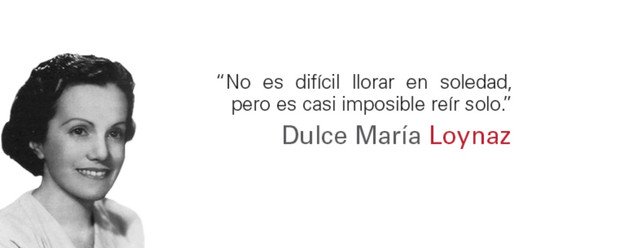
It is not difficult to cry alone, but it is almost impossible to laugh alone.
Quien me conoce sabe lo que significa Dulce María Loynaz en mi vida, al punto que mi primer Premio de Fotografía me lo dieron en su casa de La Habana. Ese día fue el último que me acompañó mi mamá, que luego falleció en 2016; por lo cual ese día fue sumamente importante para mí. Mi madre nació un 11 de diciembre y Dulce María un 10, si bien coincidieron en tiempo y espacio ya que Dulce María murió en 1997, creo que ambas recrearon en mí una luz en forma de flor de loto en mi corazón. Sin la poesía de Dulce María yo no sería quien soy.
Durante algún tiempo visité la Casa de Dulce María por temas profesionales, y simplemente se va colando dentro de ti esa energía, las tardes de poesías dónde en cierto momento ponían algún poema de ella por su propia voz; cada cuarto dónde existen historias fantasmagóricas. Todas las personas que han trabajado en el Centro Dulce María Loynaz de la Habana tienen historias de ver algo o sentir cosas.
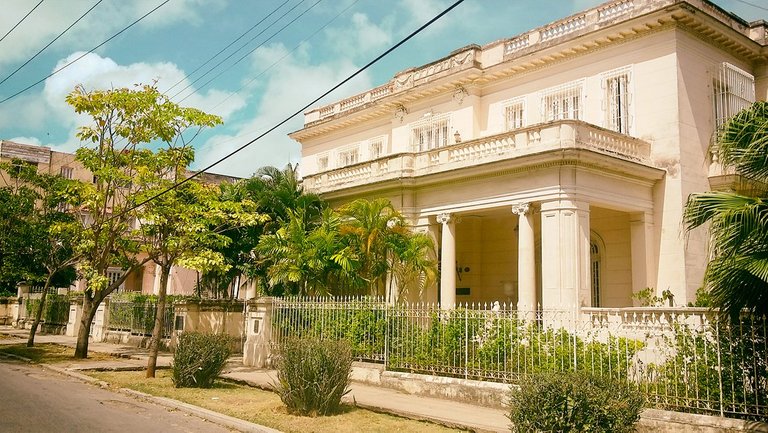
Personamente sentía la energía casi siempre de lo cotidiano de un caserón de El Vedado en la Habana, ese olor y la brisa del malecón que se mete por entre los árboles y las cuadrículas urbanas, herencia romana que nos legaron los españoles. Se siente el aquello de un barrio que fue de personas con mucho dinero, y siento que Dulce María no se sentía a gusto, siempre fue alguien fuera de su tiempo, le tocó pasar por mucho, pero el que lleva poesía en su corazón se despertó y está lleno de luz inagotable.
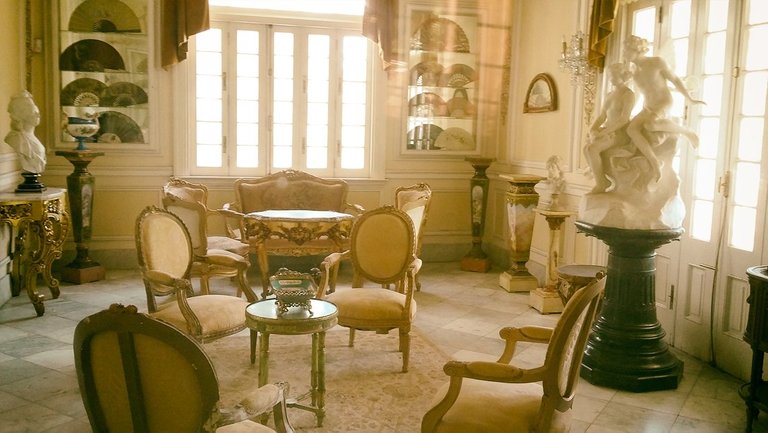
Ella fue abogada paralelamente a escribir, lo dejó en 1961 y quien conoce la historia de de Cuba se imagina el porqué. Escribió Jardín durante 7 años, una novela tan maravillosa que vale la pena leerla y acariciarla con los ojos durante el proceso. Se enamoró del Faraón Tutankamón y le escribió Carta de amor.
Fue muy prolífera durante los años previos al 1959, era una persona que viajaba y se mantenía activa, y luego la silenciaron durante años, para volver en la década del 80 y no parar, fue así que en 1992 obtiene el Premio Cervantes. Siento que ella jamás dejó Cuba porque mantuvo el aquello de que el arte todo lo cambia y dejó esa semilla en su casa, esa de reunir intelectuales y artistas para compartir, y de cierta forma mantener vivo el espíritu de la creación.
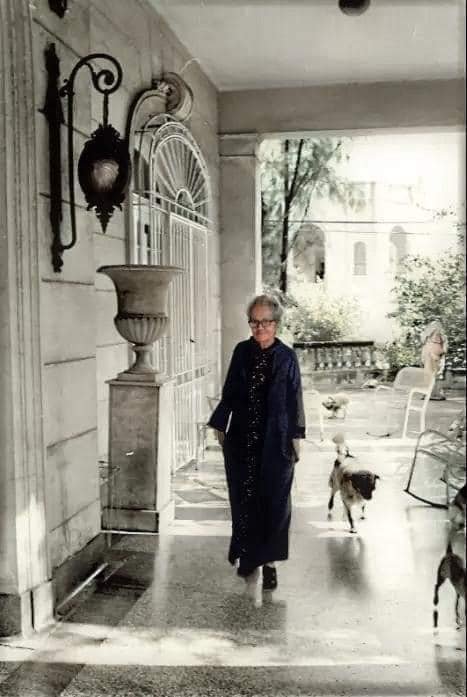
Un día me fui al Cementerio de Colón, donde sabía que estaba su tumba, pero no sabía exactamente dónde, así que le pregunté al Sacerdote de la Iglesia que está en el centro del cementerio. Me sorprendió tanto que aquel jóven Sacerdote me acompañara hasta su tumba, no me dio una orientación, simplemente me dijo: -Sígueme. Con aquel vestuario de Misa todo Blanco y Dorado impolutos, el sacerdote me llevó ante Dulce María, y fui inmensamente feliz, a ella la aman más alla del tiempo y el espacio. Gracias Dulce María Loynaz por tanta energía creadora y tantas cosas.
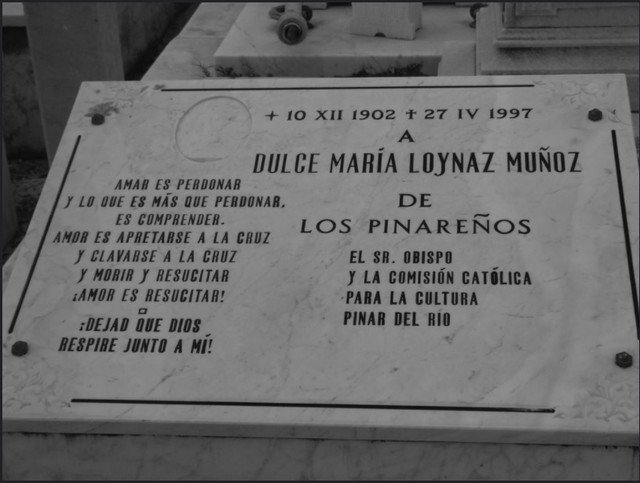
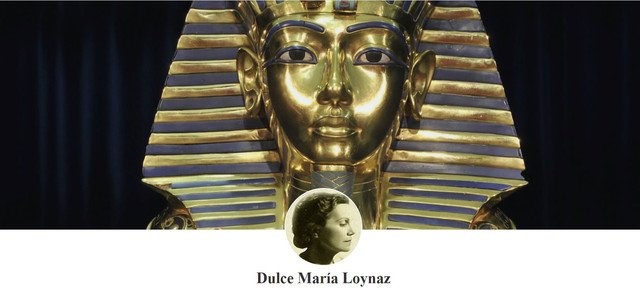
Carta de amor al rey Tut Ank Amen / Love Letter to King Tut Ank Amen
Joven Rey Tut-Ank-Amen:
En la tarde de ayer he visto en el museo la columnita de marfil que tú pintaste de azul, de rosa y de amarillo.
Por esa frágil pieza sin aplicación y sin sentido en nuestras bastas existencias, por esa simple columnita pintada por tus manos finas —hoja de otoño—hubiera dado yo los diez años más bellos de mi vida, también sin aplicación y sin sentido... Los diez años del amor y de la fe.
Junto a la columnita vi también, joven Rey Tut-Ank-Amen, vi también ayer tarde —una de esas tardes del Egipto tuyo—vi también tu corazón guardado en una caja de oro.
Por ese pequeño corazón en polvo, por ese pequeño corazón guardado en una caja de oro y esmalte, yo hubiera dado mi corazón joven y tibio: puro todavía.
Porque ayer tarde, Rey lleno de muerte, mi corazón latió por ti lleno de vida, y mi vida se abrazaba a tu muerte y me parecía a mí que la fundía...
Te fundía la muerte dura que tienes pegada a los huesos con el calor de mi aliento, con la sangre de mi sueño, y de aquel trasiego de amor y muerte estoy yo todavía embriagada de muerte y de amor...
Ayer tarde—tarde de Egipto salpicada de ibis blancos—te amé los ojos imposibles a través de un cristal...
Y en otra lejana tarde de Egipto como esta tarde—luz quebrada de pájaros—tus ojos eran inmensos, rajados a lo largo de las sienes temblorosas...
Hace mucho tiempo en otra tarde igual que esta tarde mía, tus ojos se tendían sobre la tierra, se abrían sobre la tierra como los dos lotos misteriosos de tu país.
Ojos rojillos eran; oreados de crepúsculos y del color del río crecido por el mes de septiembre.
Ojos dueños de un reino eran tus ojos, dueños de las ciudades florecientes, de las gigantes piedras ya entonces milenarias, de los campos sembrados hasta el horizonte, de los ejércitos victoriosos más allá de los arenales de la Nubia, aquellos ágiles arqueros, aquellos intrépidos aurigas que se han quedado para siempre de perfil, inmóviles en jeroglíficos y monolitos.
Todo cabía en tus ojos, Rey tierno y poderoso, todo te estaba destinado antes de que tuvieras tiempo de mirarlo... Y ciertamente no tuviste tiempo.
Ahora tus ojos están cerrados y tienen polvo gris sobre los párpados; más nada tienen que ese polvo gris, ceniza de los sueños consumidos. Ahora entre tus ojos y mis ojos, hay para siempre un cristal inquebrantable...
Por esos ojos tuyos que yo no podría entreabrir con mis besos, daría a quien los quisiera, estos ojos míos ávidos de paisajes, ladrones de tu cielo, amos del sol del mundo.
Daría mis ojos vivos por sentir un minuto tu mirada a través de tres mil novecientos años... Por sentirla ahora sobre mí —como vendría—vagamente aterrada, cuajada del halo pálido de Isis.
Joven Rey Tut-Ank-Amen, muerto a los diecinueve años: déjame decirte estas locuras que acaso nunca te dijo nadie, déjame decírtelas en esta soledad de mi cuarto de hotel, en esta frialdad de las paredes compartidas con extraños, más frías que las paredes de la tumba que no quisiste compartir con nadie.
A ti las digo, Rey adolescente, también quedado para siempre de perfil en su juventud inmóvil, en su gracia cristalizada... Quedado en aquel gesto que prohibía sacrificar palomas inocentes, en el templo del terrible Ammon-Ra.
Así te seguiré viendo cuando me vaya lejos, erguido frente a los sacerdotes recelosos, entre una leve fuga de alas blancas...
Nada tendré de ti, más que este sueño, porque todo me eres vedado, prohibido, infinitamente imposible. Para los siglos de los siglos tus dioses te guardaron en vigilia, pendientes de la última hebra de tus cabellos.
Pienso que tus cabellos serían lacios como la lluvia que cae de noche... Y pienso que por tus cabellos, por tus palomas y por tus diecinueve años tan cerca de la muerte, yo hubiera sido lo que ya no seré nunca: un poco de amor.
Pero no me esperaste y te fuiste caminando por el filo de la luna en creciente; no me esperaste y te fuiste hacia la muerte como un niño va a un parque, cargado de los juguetes con que aún no te habías cansado de jugar... Seguido de tu carro de marfil, de tus gacelas temblorosas...
Si las gentes sensatas no se hubieran indignado, yo habría besado uno a uno estos juguetes tuyos, pesados juguetes de oro y plata, extraños juguetes con los que ningún niño de ahora—balompedista, boxeador—sabría ya jugar.
Si las gentes sensatas no se hubieran escandalizado, yo te habría sacado de tu sarcófago de oro, dentro de tres sarcófagos de madera, dentro de un gran sarcófago de granito, te hubiera sacado de tanta siniestra hondura que te vuelve más muerto para mi osado corazón que haces latir... que sólo para ti ha podido latir, ¡oh, Rey dulcísimo!, en esta clara tarde del Egipto—brazo de luz del Nilo.
Si las gentes sensatas no se hubieran encolerizado, yo te habría sacado de tus cinco sarcófagos, te hubiera desatado las ligaduras que oprimían demasiado tu cuerpo endeble y te hubiera envuelto suavemente en mi chal de seda...
Así te hubiera yo recostado sobre mi pecho, como un niño enfermo...Y como a un niño enfermo habría empezado a cantarte la más bella de mis canciones tropicales, el más dulce, el más breve de mis poemas.

Young King Tut-Ank-Amen:
Yesterday afternoon in the museum, I saw the little ivory column which you painted blue and pink and yellow.
For that fragile object, useless and meaningless in our mean existence, for that simple little column painted by your fine hands — leaves of autumn — I would have given the most beautiful ten years of my life, also useless and meaningless. Ten years of love and faith.
Next to the little column I also saw, young King Tut-Ank-Amen, I also saw yesterday afternoon — one of those brilliant afternoons of your Egypt — I also saw your heart, kept safe in a gold box.
For that little heart crumbled to dust, for that little heart kept in a box of enamelled gold, I would have given my own heart, young and warm; still pure.
Because yesterday afternoon, King filled with death, my heart beat for you, full of life, and my life embraced your death and, it seemed to me, melted it.
It melted the hard death clinging to your bones, with the heat of my breath, with the blood of my dream, and after that uproar of love and death I am still intoxicated with love and with death...
Yesterday afternoon — afternoon of Egypt sprinkled with white ibises — I loved your impossible eyes beyond the crystal.
And in another distant Egyptian afternoon like this afternoon — its light shattered with birds — your eyes were immense, split along your trembling brows.
Long ago in another afternoon like this afternoon of mine, your eyes spread themselves above the earth, opened themselves above the earth like the two mysterious lotuses of your country.
Reddened eyes: dried by the twilight air, the color of rivers swollen with September.Lords of a kingdom were your eyes, lords of flourishing cities, of gigantic stones then already a thousand years old, of fields sown to the horizon, of armies victorious far beyond the deserts of Nubia, whose agile archers, whose intrepid charioteers have been frozen forever in profile in hieroglyphs and on monoliths.
Everything fit into your eyes, tender and powerful King, everything was destined for you before you had time to see it. And certainly you didn't have time.
Now your eyes are closed and a gray dust covers the eyelids; only this gray dust, the ashes of exhausted dreams. Now between your eyes and my eyes forever lies an adamantine crystal.
For these your eyes which I could never pry open with my kisses, I would give to whoever wants them my own eyes, avid for landscapes, thieves of your heaven, masters of the world's sun. I would give my living eyes to feel for a moment your gaze across three thousand nine hundred years. To feel your gaze on me now — however it might come — vaguely terrified, curdled out of the pallid halo of Isis.
Young King Tut-Ank-Amen, dead at nineteen years of age: let me tell you these crazy things which perhaps no one else has ever told you, permit me to tell them to you in the solitude of my hotel room, in the chill of walls shared with strangers, walls colder than the walls of the tomb which you didn't wish to share with anyone.
I tell you this, adolescent King, frozen forever in profile in your immovable youth, in your crystallized grace... Frozen in that expression which forbade the sacrifice of innocent doves, in the temple of the terrible Ammon-Ra.
This is how I will continue to see you when I am far away, you standing straight before the jealous priests in a flurry of white wings...
I will take nothing from you beyond this dream, because you are everything which is foreclosed to me, prohibited, infinitely impossible. From century to century your gods kept watch over you, hanging onto the very last hair.
I think that your hair must have been straight as the night rain. And I think that because of your hair, because of your doves and your nineteen years so close to death, I would have been then what I will never be now: a little bit of love.
But you didn't wait for me and you fled along the edge of the crescent moon; you didn't wait for me and you fled toward death like a child going to the park, laden with toys with which you are not yet tired of playing. Followed by your ivory carriage, your trembling gazelles.
If sensible people wouldn't have been indignant, I would have kissed your toys one by one, heavy toys of gold and silver, strange toys with which no ordinary child — soccer-player, boxer — would know how to play.
If sensible people wouldn't have been scandalized, I would have taken you from your golden sarcophagus, enclosed in three wooden sarcophagi inside a great sarcophagus of granite, I should have taken you from the depths, so sinister, which render you more dead to my bold heart which you make beat strongly, which only for you has ever beaten, oh sweetest King! in this bright afternoon of Egypt — arm of the Nile's light.
If sensible people wouldn't have been enraged, I would have taken you from your five sarcophagi, I would have unwrapped the bindings which so oppress your feeble body, and I would have wrapped you softly in my silken shawl.
I would have rested you upon my breast like a sick child. And as if to a sick child, I would have begun to sing to you the most beautiful of my tropical songs, the sweetest, the briefest of my poems.
Posted via proofofbrain.io
Hermoso post de Dulce María Loynaz. Una genia, una mujer que se nota que vino de otro lado. Sus dulces palabras me resuenan a los tiempos donde el amor era un tanto difícil de demostrar. Bello poema a Tut-Ank-Amen. !LUV2
Para mí Dulce María fue y siempre será La Dama de la Habana, tú tienes a Alfonsina y yo a Dulce María, espero tu posto con ansias !LUV 3
@mimi05, you were given LUV from @alfarero. About: https://peakd.com/@luvshares
@alfarero, you were given LUV from @mimi05. About: https://peakd.com/@luvshares